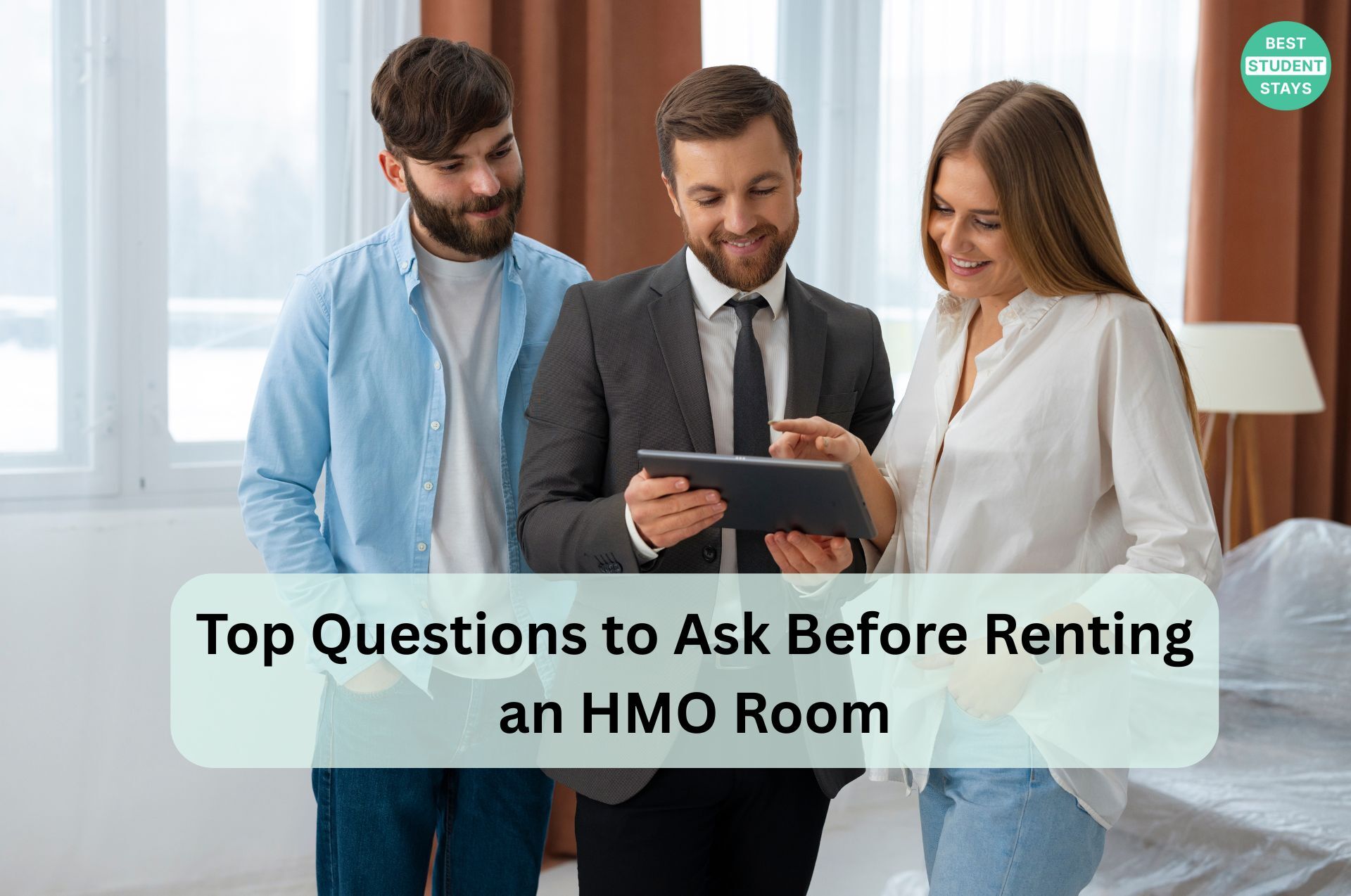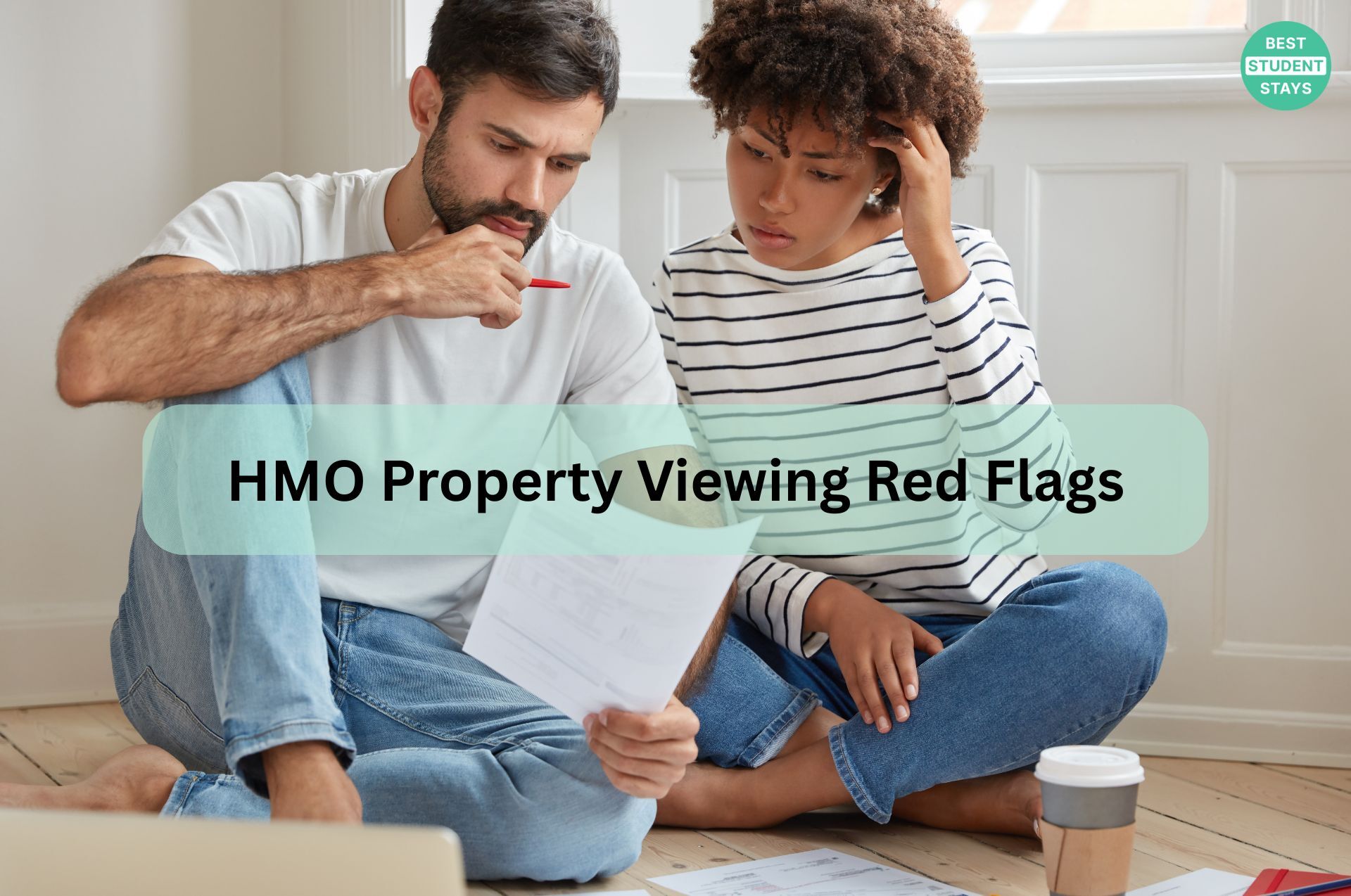Looking for your first HMO room? Feeling overwhelmed by all the options?
I get it. When I was hunting for my first student house share, I made every mistake possible. Didn't ask about bills. Assumed WiFi was included. Never checked if the landlord was legit.
Big mistake!!
Ended up in a nightmare flat with no heating, dodgy housemates, and a landlord who ignored every text. Learned my lesson the hard way.
Don't be me. Ask the right questions to ask before renting HMO room and save yourself months of stress.
TL;DR: Essential HMO Questions Checklist
Legal & Licensing: Is the HMO licensed? Who's the registered landlord?
Money Matters: What's included in rent? How much deposit? Bills breakdown?
Safety First: Fire safety equipment? Locks on doors? Emergency procedures?
House Rules: Guest policy? Cleaning rota? Noise restrictions?
Practical Stuff: Internet speed? Parking? Storage space?
Red Flags: Pressure to sign immediately? No viewing allowed? Unclear contracts?
Why These Questions Matter for HMO Living
HMO rooms aren't like regular rentals. You're sharing space with strangers. Multiple tenants mean complex dynamics. Legal requirements are stricter.
One wrong question missed = months of problems.
What makes HMO different:
-
Shared facilities create unique challenges
-
More housemates = more potential conflicts
-
Stricter legal requirements for landlords
-
Different deposit and contract arrangements
-
Complex bill splitting and responsibility
Real story: My friend Tom rented an HMO room without asking about the cleaning arrangement. Turned out he was expected to clean the entire house weekly because he was the "newest tenant." Spent three months scrubbing toilets before finding out this wasn't legal.
Essential Legal and Licensing Questions
1. Is This Property Properly Licensed?
Why this matters: Unlicensed HMOs are illegal. You could face eviction with no notice.
What to ask:
-
"Can I see the HMO license?"
-
"When does the license expire?"
-
"How many people are legally allowed here?"
Red flags:
-
Can't produce license immediately
-
Vague answers about "paperwork"
-
More people living there than license allows
2. Who is the Legal Landlord?
Why crucial: You need to know who's actually responsible.
Questions to ask:
-
"Are you the property owner or managing agent?"
-
"Can I have the landlord's contact details?"
-
"Who do I contact for emergencies?"
What to verify:
-
Name matches on all documents
-
Contact details are genuine
-
They're registered with deposit protection scheme
3. What Are My Tenant Rights?
Know your legal protections:
|
Right |
What It Means |
Why Important |
|
Deposit Protection |
Money held in government scheme |
Get deposit back fairly |
|
24-hour notice |
Landlord must give notice to enter |
Privacy protection |
|
Repair responsibilities |
Landlord must fix structural issues |
Safe living conditions |
|
Eviction protection |
Proper legal process required |
Housing security |
Money and Contract Questions
4. What Exactly Does My Rent Include?
Essential breakdown:
Always included in HMO rent:
-
Water bills
-
Council tax (if all tenants are students)
Usually included:
-
Gas and electricity
-
Internet
-
Basic contents insurance
Often extra costs:
-
Premium internet packages
-
Parking permits
-
Professional cleaning
-
Late payment fees
5. How Much is the Deposit and How is it Protected?
Standard deposit amounts:
-
Traditional: 4-6 weeks rent
-
Modern schemes: £100-200 upfront fee
-
No-deposit options: Available through some platforms
Protection questions:
-
"Which deposit protection scheme do you use?"
-
"When will I receive my deposit information?"
-
"What could affect my deposit return?"
Major red flag: Landlord can't name the protection scheme immediately.
6. How Do Bills Work in Practice?
Get specifics:
-
Monthly spending caps on utilities
-
What happens if bills exceed limits
-
How readings are taken and bills split
-
Who's responsible if housemates don't pay
Smart tip: Ask for last year's actual bills to see real costs.
Safety and Security Questions
7. What Fire Safety Equipment Exists?
Legally required in HMOs:
-
Smoke alarms in every bedroom
-
Fire blanket in kitchen
-
Carbon monoxide detector near gas appliances
-
Clear escape routes marked
-
Fire doors where required
Questions to ask:
-
"When were alarms last tested?"
-
"Is there a fire evacuation plan?"
-
"Who maintains safety equipment?"
8. What Security Measures Are in Place?
Essential security features:
-
Locks on individual bedroom doors
-
Secure front door entry system
-
Window locks on ground floor
-
External lighting
-
CCTV (in common areas only)
Personal safety questions:
-
"Who has keys to my room?"
-
"Is there a key safe or entry system?"
-
"What's the guest policy for security?"
House Rules and Living Arrangements
9. What Are the Official House Rules?
Typical HMO rules cover:
-
Guest overnight policies
-
Noise restrictions and quiet hours
-
Kitchen and bathroom usage schedules
-
Cleaning responsibilities
-
Smoking and alcohol policies
Get it in writing: Verbal agreements mean nothing when disputes arise.
10. How Do You Handle Housemate Conflicts?
What to ask:
-
"What's the process for reporting issues?"
-
"How are disputes between tenants resolved?"
-
"Can problem tenants be removed?"
-
"Is there mediation available?"
Good landlords have:
-
Clear complaint procedures
-
Quick response times
-
Fair resolution processes
-
Experience handling conflicts
Practical Living Questions
11. What's the Internet Situation?
Critical for students:
-
Speed test results (ask for proof)
-
Data limits or restrictions
-
WiFi coverage in all rooms
-
Technical support availability
Minimum standards for 2025:
-
25Mbps+ download speed
-
Unlimited data
-
Reliable connection for video calls
-
Coverage in bedrooms
12. What Storage and Facilities Are Available?
Space considerations:
-
Wardrobe and drawer space in bedroom
-
Kitchen cupboard allocation
-
Freezer space division
-
Bike storage options
-
Post and package delivery
Shared facility access:
-
Washing machine usage schedule
-
Garden or outdoor space rules
-
Study areas or quiet zones
-
Parking arrangements
Red Flags to Watch Out For
Immediate Warning Signs
Run away if:
-
Pressure to sign same day
-
Can't view the actual room you'll get
-
Landlord asks for cash payments only
-
No written tenancy agreement offered
-
Other tenants seem unhappy or stressed
During viewing red flags:
-
Property looks neglected
-
Basic amenities don't work
-
Strange smells or dampness
-
Overcrowded conditions
-
No safety equipment visible
Financial Red Flags
Money warning signs:
-
Rent significantly below market rate
-
Requests for payments before contract signed
-
No clear bill breakdown provided
-
Deposit not going to protection scheme
-
Hidden fees mentioned after viewing
Questions About Current Housemates
13. Who Are Your Current Tenants?
What to find out:
-
Mix of students/professionals/ages
-
How long current tenants have lived there
-
General lifestyle compatibility
-
Any ongoing issues or concerns
Meeting current housemates:
-
Ask to speak with them privately
-
Get honest feedback about living there
-
Understand house dynamics
-
Check if they're happy with arrangements
14. What's the Tenant Turnover Like?
Stability indicators:
-
How often rooms become available
-
Reasons people typically leave
-
Average length of tenancy
-
Seasonal patterns
High turnover = potential problems
Location and Neighborhood Questions
15. What's the Local Area Like?
Practical location concerns:
-
Distance to university/college
-
Public transport links and frequency
-
Local shops and amenities
-
Safety in the area, especially at night
Ask for specifics:
-
"How long does it take to get to [your university] by bus?"
-
"Where's the nearest supermarket?"
-
"Are there any safety concerns I should know about?"
16. What About Parking and Transport?
Transport considerations:
-
Parking availability and costs
-
Bike storage security
-
Public transport passes and costs
-
Walking routes to key destinations
Technology and Modern Living
17. How Do Digital Systems Work?
Modern HMO tech:
-
Online rent payment systems
-
Digital maintenance reporting
-
Smart home features (heating, security)
-
Communication apps or platforms
Questions to ask:
-
"How do I report maintenance issues?"
-
"Is there an app for house communication?"
-
"How do heating controls work?"
Contract and Legal Questions
18. What Type of Tenancy Agreement Is This?
Common HMO contracts:
-
Individual room licenses
-
Joint tenancy agreements
-
Rolling monthly contracts
-
Fixed-term agreements
Key differences affect:
-
Your legal responsibilities
-
How you can leave
-
What happens if others leave
-
Rent liability
19. What Happens If I Want to Leave?
Exit arrangements:
-
Notice period required
-
Replacement tenant responsibilities
-
Deposit return timeframes
-
Final inspection process
Get clear answers about:
-
Early departure penalties
-
Finding replacement tenants
-
Final cleaning expectations
-
Damage assessment procedures
Special Considerations for Students
20. Are There Student-Specific Policies?
Student-friendly features:
-
Term-time only contracts
-
Parent/guarantor arrangements
-
Summer break options
-
Group booking possibilities
Questions for student HMOs:
-
"Do you offer term-time contracts?"
-
"What happens during university holidays?"
-
"Can my parents be guarantors?"
-
"Are there study-friendly quiet hours?"
Emergency and Maintenance Questions
21. How Do Repairs and Maintenance Work?
Repair response times:
-
Emergency repairs (24 hours)
-
Urgent repairs (48-72 hours)
-
Routine maintenance (1-2 weeks)
Who to contact:
-
Emergency contact numbers
-
Online reporting systems
-
Response time guarantees
-
Tenant responsibilities vs landlord duties
Final Decision Questions
22. Can I Have Everything in Writing?
Essential documents:
-
Full tenancy agreement
-
House rules document
-
Inventory checklist
-
Contact information sheet
-
Emergency procedures
Before signing:
-
Read everything carefully
-
Ask questions about unclear terms
-
Get verbal promises added to contract
-
Keep copies of all documents
Making Your Decision
The Final Checklist
Before committing to any HMO room:
✅ Legal requirements met:
-
HMO license verified
-
Landlord details confirmed
-
Deposit protection arranged
-
Safety equipment present
✅ Financial terms clear:
-
All costs understood
-
Payment methods confirmed
-
Bill arrangements explained
-
Deposit protection confirmed
✅ Living arrangements suitable:
-
House rules acceptable
-
Housemates seem compatible
-
Facilities meet your needs
-
Location works for you
✅ Support systems in place:
-
Maintenance procedures clear
-
Emergency contacts available
-
Dispute resolution process exists
-
Communication methods established
What to Do If Something Feels Wrong
Trust your instincts. If anything feels off during the viewing or questioning process, it probably is.
Common gut feelings that matter:
-
Landlord seems evasive or pushy
-
Property feels neglected or unsafe
-
Current tenants seem unhappy
-
Financial arrangements seem unclear
Better to keep looking than regret a rushed decision.
Getting Help and Advice
Free resources for HMO tenants:
-
University accommodation services
-
Citizens Advice Bureau
-
Local council housing teams
-
Student unions and support services
When to seek professional help:
-
Contract terms seem unfair
-
Landlord refuses to answer key questions
-
Property appears to violate licensing rules
-
You're unsure about your rights
Your Next Steps
Finding the right HMO room takes time and thorough research. But asking these questions to ask before renting HMO room will save you from costly mistakes and stressful living situations.
Remember:
-
Good landlords welcome questions
-
Professional properties have clear answers ready
-
Your safety and comfort matter most
-
It's better to wait than settle for problems
Ready to start your search? Use this checklist during every viewing. Don't sign anything until you're completely satisfied with all the answers.
Looking for verified HMO properties with transparent answers to all these questions? Browse quality student accommodation options at Best Student Stays, where all listings meet high standards for safety, licensing, and tenant support.
Your perfect HMO room is out there. These questions will help you find it.
Remember: A good landlord will appreciate tenants who ask thorough questions. If anyone pressures you to sign without getting proper answers, that's your cue to walk away.



